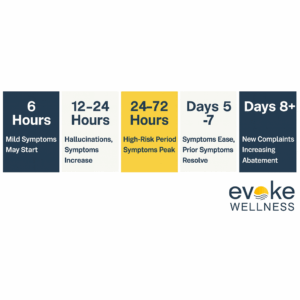Even after months—or years—of sobriety, it can hit you. The sense of drift. The flatness. The quiet hum of “Is this it?”
You’ve already done something incredibly hard: leaving the alcohol detox center behind, rebuilding your routines, staying alcohol-free. But now, the challenge looks different. Instead of surviving withdrawal, you’re figuring out how to keep recovery alive when the urgency has faded and the days blend together.
The truth is, long-term sobriety has its own set of obstacles. They don’t get as much attention as those early white-knuckle days, but they’re just as important to navigate. Here’s how to stay grounded, connected, and moving forward—without pretending everything feels amazing all the time.
Name the Disconnection Before It Grows
One of the most common threats to long-term sobriety isn’t relapse—it’s emotional disconnection. It starts quietly. You might skip a meeting here and there. You stop returning texts from friends in recovery. You tell yourself you’re “too busy” for check-ins.
These small gaps can turn into distance you don’t know how to bridge. Naming it—whether to yourself, a sponsor, or a trusted friend—is the first step to reversing it. Disconnection thrives in silence. The sooner you speak it, the sooner you can get back to the relationships and routines that protect your recovery.
Revisit What Worked in the Early Days
Think back to those first weeks after detox. You probably had a structure: a morning routine, therapy sessions, daily check-ins, maybe even a set bedtime. Over time, it’s normal to loosen the schedule—but when disconnection creeps in, returning to those basics can help.
This doesn’t mean living like you’re in crisis. It’s about borrowing from the structure that helped you stay strong. Even something as small as reintroducing a nightly gratitude list or setting aside 10 minutes each morning to check in with yourself can make a difference.
Find Something New to Reach For
Sobriety is more than not drinking—it’s building a life you want to protect. If you’re feeling flat, it might be time to add a new challenge or source of joy:
- Sign up for a class you’ve always been curious about
- Volunteer with an organization that aligns with your values
- Set a goal, like running a local race or learning an instrument
This isn’t about keeping busy. It’s about replacing the “why not?” that alcohol used to answer with a “why yes?” that excites you.
Stay Connected to Recovery Spaces
You may not feel the need to attend meetings or groups as often as you once did—but keeping one foot in the recovery community matters. It can be as simple as:
- Attending one meeting a month
- Scheduling coffee with a sober friend
- Participating in alumni events in San Marcos
At Evoke Wellness TX, we see that alumni who maintain even minimal, regular connections to recovery spaces tend to navigate life’s bumps more smoothly. The point isn’t frequency—it’s consistency.
Watch for the Quiet Red Flags
Not all warning signs of relapse are obvious. For long-term alumni, they can be subtle:
- Letting self-care slide because “you’re fine”
- Avoiding honest conversations about how you’re doing
- Feeling emotionally numb for days or weeks at a time
These moments might not set off alarms, but they matter. The earlier you respond—by reconnecting with your supports or seeking professional guidance—the easier it is to reset.
Let Yourself Need Support Again
It’s easy to believe you “should” have it all figured out by now. But recovery isn’t about perfection—it’s about staying honest with yourself.
Needing help doesn’t mean you’ve failed. Sometimes it means scheduling a few therapy sessions, joining a retreat, or even returning to structured care for a short period. The point isn’t to go backward—it’s to move forward with more tools than before.
FAQs About Maintaining Sobriety After Detox
Is it normal to feel disconnected even after years sober?
Yes. Long-term recovery often brings stretches where life feels flat or emotionally distant. This doesn’t mean your sobriety is at risk—it means your brain and body are craving new connection and purpose.
Do I have to keep going to meetings forever?
Not necessarily, but most people benefit from maintaining some form of recovery connection. This could be meetings, alumni programs, therapy, or sober community events.
What should I do if I start thinking about drinking again?
Don’t wait for the thoughts to pass—reach out to someone you trust immediately. The sooner you talk about it, the less power it has.
Can returning to a detox center help if I’m still sober?
Yes. While you may not need medical detox again, some people return to a treatment center for a short “tune-up” in structure and support when they feel disconnected.
What if my friends or family think I should be “over it” by now?
Recovery isn’t something you graduate from. It’s ongoing. The opinions of others don’t change the fact that maintaining sobriety requires ongoing care and attention.
Practical Steps You Can Take This Month
- Schedule one recovery connection: a call, coffee, or meeting.
- Start one new personal goal that excites you.
- Revisit one old habit from your early recovery that gave you strength.
- Notice one thing daily you’re grateful for—write it down.
- Be honest once this week about how you’re really doing.
Final Word: Recovery Is Ongoing, Not Over
Sobriety isn’t a finish line—it’s a path you walk. Some days it’s steep. Some days it’s flat. And some days, it’s just about putting one foot in front of the other.
If you’re feeling stuck, you’re not broken, and you’re not alone. You’ve already faced harder moments than this—and you’ve made it through. You can do it again.
Call (888)450-2285 or visit our alcohol detox center services in San Marcos, Texas to learn more. Whether it’s your first step or your next one, we’re here to help you keep going.



